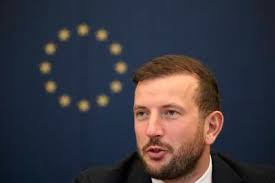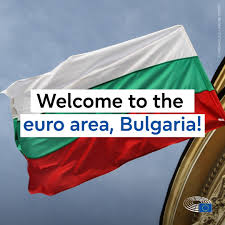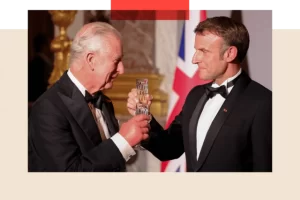EU official says UAE can lead conversation on green energy switch at Cop28

Brussels: Fossil fuel-rich countries like the UAE are demonstrating how to make a difference in leading the global conversation about transitioning away from oil, gas and coal to more climate-friendly sources of energy, the EU Environment Commissioner Virginijus Sinkevicius has told The National.
As states finalise their negotiating positions ahead of Cop28, which will be held in Dubai in November, Mr Sinkevicius said that “having a presidency located in an oil and gas-rich region” and committed to phasing out unabated fossil fuels was a “strong signal to other countries”.
“We expect and hope that [the UAE] will continue pushing for that,” he said. “I think that it is going to be a moment of truth for the UAE to show their leadership.”
The 32-year-old Lithuanian politician spoke to The National from his office in Brussels shortly after returning from his first official trip to China. Mr Sinkevicius struck an upbeat tone, saying that he hoped that “the dynamics in Dubai would be different” than at the G20, where India had “done a really good job in a challenging situation”.

One reason to hope for more tangible outcomes at the UN climate meeting, Mr Sinkievicius said, is the high profile carved out for the private sector at the UAE-led event. “We are seeing that more and more countries and the private sector are taking what Paris set up for us as goals much more seriously,” he said.
“This is absolutely critical. Many still think that phasing out is going to cause a slowdown of the economy, which is absolutely not true.”
The overarching goal of the 2015 Paris Agreement is to limit the global temperature increase to 1.5 degrees above pre-industrial levels. This entails greenhouse gas emissions peaking before 2025 and declining by 43 per cent by 2030. The EU commissioner said the impact of weather extremes in Europe and elsewhere was having a salutatory effect on how people view climate challenges.
“The summer we just experienced is also another proof that we are under big pressure, and scientists warn us again and again that we need to keep the planet within the 1.5 degrees boundary,” Mr Sinkevicius said, referring to extreme climate events, including wildfires and floods, that have killed thousands in recent months.
Such events reflect a “new normal” due to the effects of climate change, New York Governor Kathy Hochul warned on Saturday after dramatic floods in the city stranded commuters and forced some subway and commuter rail lines to shut down.
EU sources have said Brussels wants a clear commitment to net zero by 2050 with the understanding that the global economy must curtail its heavy dependence on fossil fuels.
In parallel, some large developing economies such as Indonesia have called out western donors for not supporting them enough in their transition away from coal out of fear of a public backlash.
For Mr Sinkevicius, whose recent achievements involve playing a key role in negotiations for a high seas protection treaty, Cop28 will be a key moment to focus on protecting the planet’s rapidly deteriorating biodiversity.
“We are working to have a biodiversity day – a dedicated day for biodiversity,” he said.
This is important to “ensure that the Paris Agreement can be bridged with the biodiversity framework that was agreed in Montreal”, he said.
Agreed in June, the Kunming-Montreal Global Biodiversity Framework is a non-binding text that aims to halt and reverse biodiversity loss by 2030 through achieving such goals as reducing the extinction rate and risk of all species tenfold.
Biodiversity loss and climate change are interlinked and must not be treated as different challenges, Mr Sinkevicius said. “Implementing the Paris Agreement won’t be enough if we have a continued degradation of the ecosystem, the oceans, the forests and so on.”
The idea that climate change and biodiversity are “two sides of the same coin” has been gaining traction, Sabien Leemans, senior biodiversity policy officer at the World Wildlife Fund, told The National.
Restoring natural habitats can help increase people’s resilience to climate change, such as through preventing droughts or floods. Forest or peatland restoration can also capture “millions of tonnes of carbon”, Ms Leemans said.
Aerial photo in September 2017 of a portion of the Great Barrier Reef off the coast of Cairns, Queensland, Australia. Parts of the reef have been subjected to a bleaching event which can damage the coral. Above-average sea water temperatures caused by global warming have been identified as a leading cause for coral bleaching worldwide. Between 2014 and 2016, the longest global bleaching events ever were recorded. In 2016, bleaching of coral on the Great Barrier Reef killed between 29 and 50 percent of the reef’s coral.
An aerial shot of the Great Barrier Reef in Australia, showing parts of the reef that has been subjected to coral bleaching.
High on Mr Sinkevicius’ biodiversity agenda is the implementation of a new global biodiversity fund, which was launched in August to help protect wild species and ecosystems, as the UN calls for contributions to protect 30 per cent of land and coastal areas by 2030.
Canada has announced it will contribute 200 million Canadian dollars ($147 million), while Britain has pledged £10 million ($13 million).
The world’s least developed countries and small island states are expected to take priority and receive more than a third of the funds, with as much as 20 per cent to go to projects led by Indigenous people and local communities.
Other senior European officials – including Mr Sinkevicius’ boss, European Commission President Ursula von der Leyen – are also expected to attend Cop28.
The European Commission hopes to lead by example with an ambitious set of climate policies that aim to make the continent carbon neutral by 2050.
They have, however, faced internal opposition within the European Parliament, and some member states’ governments have watered down green legislation amid populist rhetoric.
Mr Sinkevicius is upbeat about the proposals the Europeans have put forward. “I think there is a positive momentum that we need to keep,” he said.





